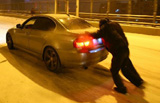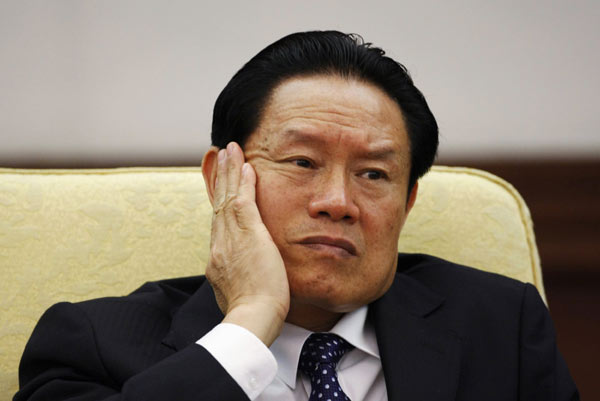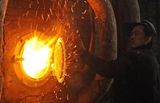Riding the Chengdu-Europe Express
By Zhang Zhao (China Daily) Updated: 2015-01-30 16:45The West China railway logistics center in Chengdu is bustling like never before.
Most significant of its cargo could be the goods transported by the Chengdu-Europe Express that began operation in 2013.
The goods are no more remarkable than those in many other trains, but it is the journey itself that stands out.
Items ranging from shoes to auto parts and computers are collected from around the country and shipped overland to Europe in only 12 days. When the return commercial leg begins operation in March, it will bring back European specialties such as wine that are welcomed by the local markets.
The express train now offers "the most convenient channel linking China and Europe with the shortest travel time", said officials, yet it is just one route managed by the logistics center.
At the intersection of the Silk Road Economic Belt and the Yangtze River Economic Belt, Chengdu itself is "running on a fast track" just like the express, said local officials.
The link to Europe has become yet another driving force in the city's contribution to China's globalization.
Last year, Chengdu registered 8.8 percent economic growth, which is expected to boost its GDP above 1 trillion yuan ($161.1 billion) for the first time.
The electronics and IT industry alone generated 280 billion yuan, while auto industry contributed 130 billion yuan.
Chengdu now produces 20 percent of the world's computers and two-thirds of the iPads. Half of the world's laptop computer chips are also encapsulated and tested in the city.
More than 260 Fortune 500 companies have opened offices in Chengdu including more than 40 in the IT sector. It also has 13 of the world's top 20 software makers.
The emerging big data business is also an attraction for the world giants.
On Dec 3, Intel Corp announced that it would invest $1.6 billion over the next 15 years to upgrade its semiconductor plant in Chengdu and introduce its latest advanced testing technology.
Auto making is another pillar industry in the city. It makes more than 1 million vehicles a year with models that include passenger cars, trucks, SUVs and special-purpose vehicles, according to local officials.
Investors include Geely-Volvo, Dongfeng Peugeot Citroen, FAW-Volkswagen and FAW-Toyota as well as many automotive component suppliers.
Tianfu New Area
Another milestone is the Tianfu New Area was approved by the State Council in October 2014 as China's 11th national-level development area. It is expected to become a major modern industrial base and help increase Chengdu's competitiveness.
Local officials said despite its inland location, the area will be a hub open to the outside world and a regional center of high-end services. As a national innovation hub, it will focus on high technology and advanced manufacturing.
The area will also be a center for finance, trade, conferences and exhibitions, R&D, creative industries, tourism and fashion, officials said.
It has already attracted more than 100 projects with a combined investment of 106.6 billion yuan. One of its zones, the Singapore-Sichuan Hi-Tech Innovation Park, has alone attracted more than 20 billion yuan in investment.
Walter Dias, managing director for United Airlines Greater China and South Korea, said that the city is transforming from an inland city far from the sea to an internationalized metropolis.
The company launched nonstop 14-hour service between Chengdu and San Francisco in June 2014. The 80 percent occupancy rate in business class was "far beyond" their expectations, he said.
Aviation hub
Chengdu Shuangliu International Airport handles 37.5 million travelers a year. It has 78 international routes including 23 direct passenger flights. It takes four hours to reach Southeast Asia and six to 10 hours to the Middle East and Europe.
The city is the fourth in China offering a 72-hour visa-free policy that allows passengers from 51 countries to spend three days in the city if they have valid third-country visas and onward flight tickets.
The city's transportation authority said that its next focus will be a combined highway and rail transport model.
It will partner with cities and regions including Shanghai, Shenzhen, Horgos, the Qinzhou bonded area and Lodz in Poland.
The efforts in both land and air transportation have helped the city overcome inland constraints as it emerges as a competitive international logistics hub, said local officials.
For 11 consecutive years, Chengdu has been named one of the "Most Recommendable Mainland Cities" by the Taiwan Electrical and Electronic Manufacturers Association. It ranked third for global image in a survey by the Gallup China Consulting Organization.
It also topped a list by Forbes magazine of the next decade's fastest-growing cities.
Andy Serwer, managing editor of Fortune magazine, said that it was "not an accident that we picked this city in West China" as the host of the 2013 Fortune Global Forum.
"As the forum highlights the 'new future of China', Chengdu represents so many trends," he said.
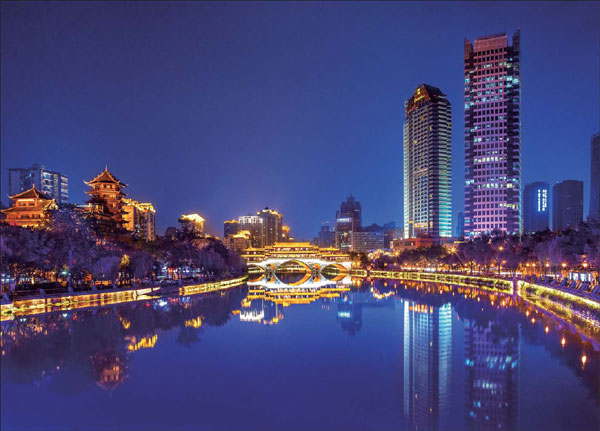 |
|
Long known for its quality of life, Chengdu has also developed into a regional hub for transportation, fi nance, trade and manufacturing. Photos Provided To China Daily |
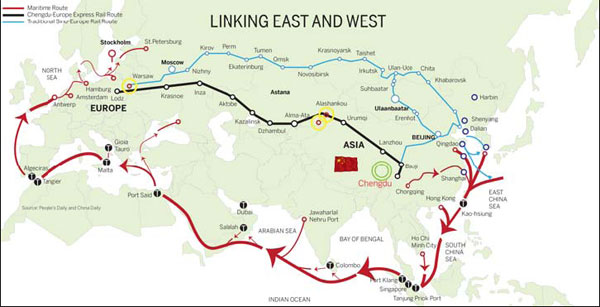 |
|
The two cargo train routes linked to Europe and Central Asia make Chengdu an important hub for land transportation |
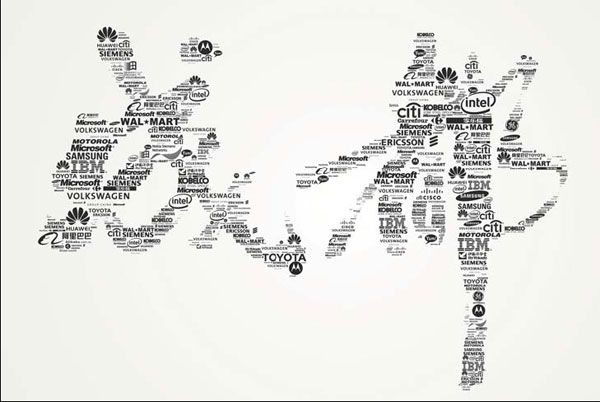 |
| The characters for 'Chengdu' made up of the logos of multinational companies in the city. |
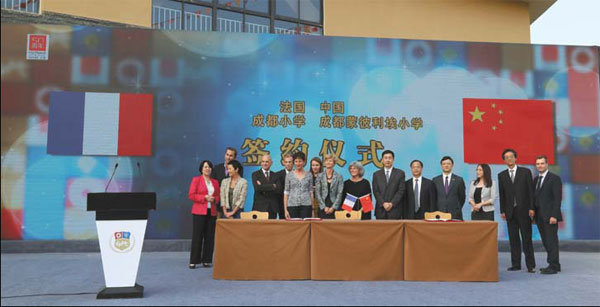 |
|
Delegates from Montpellier and Chengdu signed an agreement last year on opening the Montpellier Primary School in Chengdu. |
- Sichuan to probe everything related to fallen ex-security chief
- Media industry to be investigated in search for 'hidden conditions'
- Tmall stores protest against regulator's quality report
- Work starts on compensation claims
- 2.8 billion trips expected during spring festival in China
- China tightens prison management after scandal
- An eleven-child family in Sichuan sparks controversy
- Senior leader stresses unwavering anti-graft fight
- 2.8 billion trips expected during spring festival in China
- Scores of PLA officers punished
